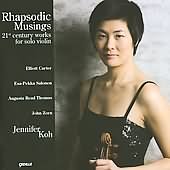Concert violinists who’ve achieved prominence on the stage and on recordings have spent most of their lives studying, practicing, learning, and perfecting the standards of the repertoire, almost all of which come from the 18th and 19th centuries. The styles and techniques for realizing these concertos and sonatas become ingrained, part of the soloist’s life–perhaps a bit too much at times! So you could think of this program as a chance to hear what such a virtuoso performer might do to indulge her need to occasionally reset, rethink, and refresh her stylistic sensibilities and technical skills–and to simply let loose of the normal strictures and structures of the classical repertoire.
I wouldn’t exactly call these pieces “rhapsodic”, or even “musings” (the title comes from one of the Elliott Carter works); they will challenge the listener’s full attention and require just a little bit of his or her own capacity to “rethink” the norms of violin playing. These pieces, to varying degrees, exploit the range and technical possibilities of the instrument–and performer!–while retaining fundamental and traditional articulations and expressive devices–lots of multiple-stops, tremolos, harmonics, glissandos, etc., mixed in with the abundant and necessary melodic/thematic material. The works range from the more “traditional” Lachen Verlernt by Esa-Pekka Salonen to John Zorn’s Goetia, a truly “demonic” set of eight pieces (incantations) written for Jennifer Koh, its title defined in Paul Griffiths’ excellent notes as “a system of black magic used to conjure demons”. The work’s guiding feature is that each of the eight movements utilizes the “same sequence of 277 pitches”.
Koh is a magnificent and exciting artist, establishing from the first notes of the first piece a vital, vibrant presence, her instrument truly speaking in whatever language the notes, phrases, melodies, harmonies, and “effects” suggest. She has showed similar technical prowess and artistic accomplishment in many other Cedille recordings, such as Solo Chaconnes from 2002 (another totally unaccompanied recital) and the fabulous String Poetic, with pianist Reiko Uchida. Here she does seem to be in her own special world, not knowing or necessarily caring if we’re listening–just playing her heart out in these difficult but ultimately accessible and engaging pieces. Of course, I’m sure she wouldn’t mind if we’re just outside the door, listening in–and if you are open to hearing some truly modern violin works, and some uncompromising, extraordinary violin playing, recorded in sound that fully captures the brilliance and richness of Koh’s Strad, then you should definitely open the door and go in. [1/18/2010]
































